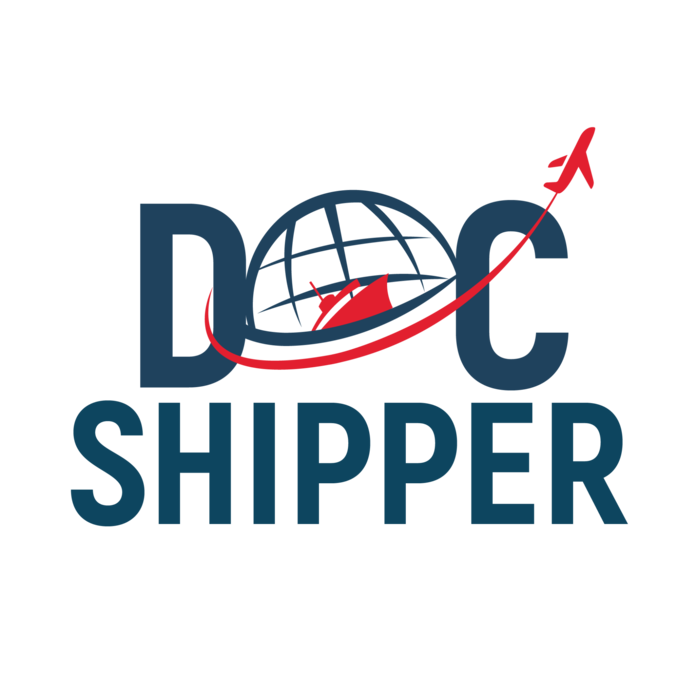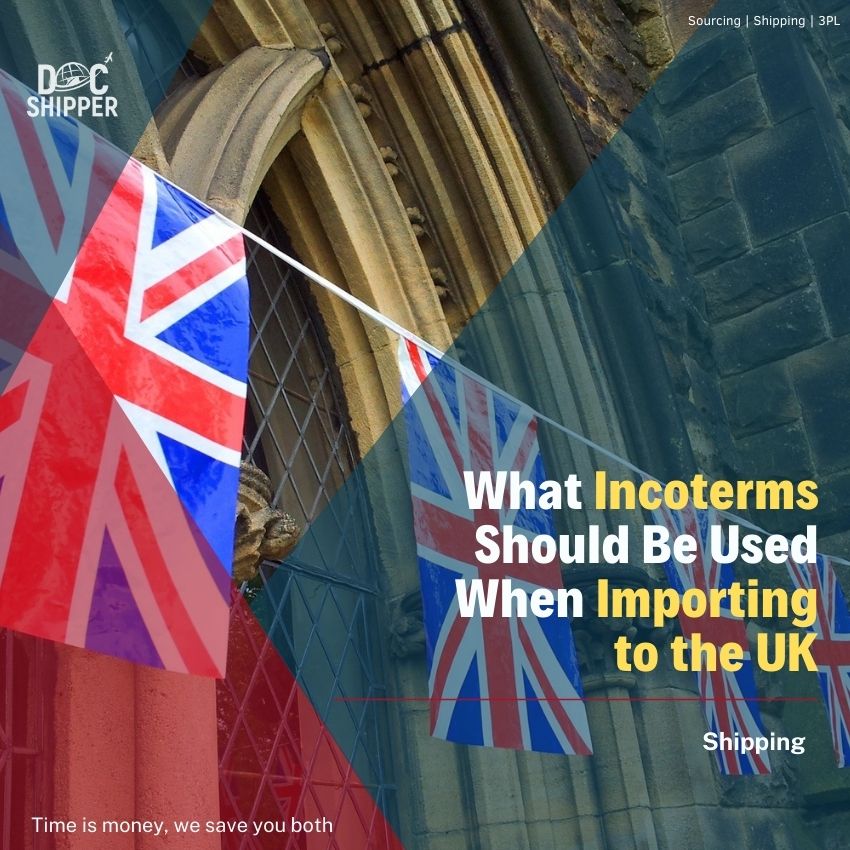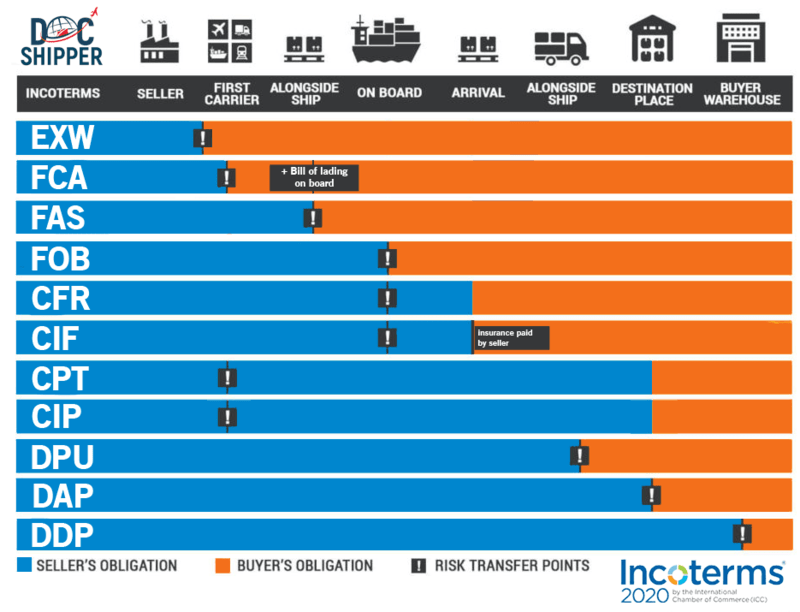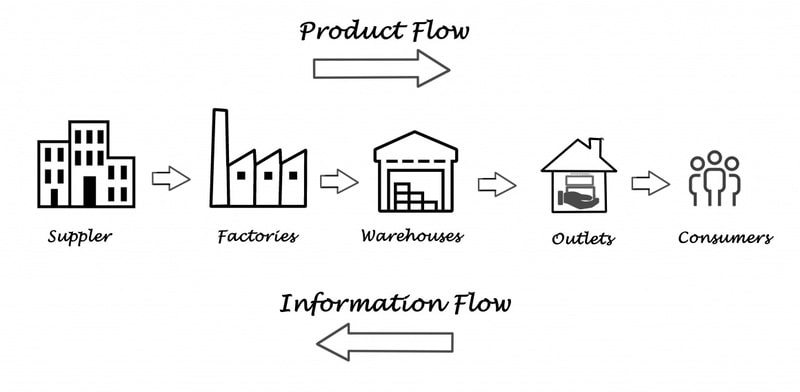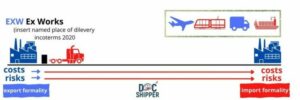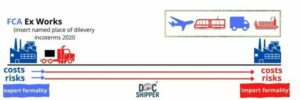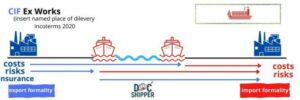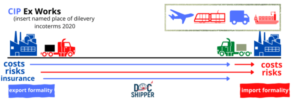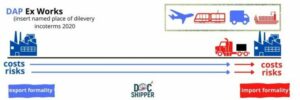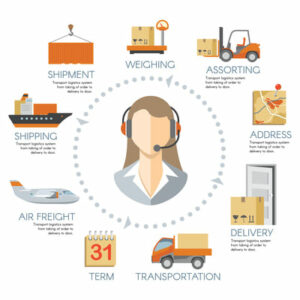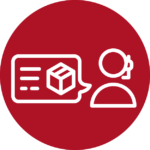Shipping internationally can be hard. There are several factors to keep in mind when exporting or importing goods from the UK. This is why incoterms exist in an international trade context. At DocShipper we are aware of the role of incoterms in running smoothly a shipping process. This is why our experts allocate all the possible means to help our clients during every step of the shipping process. We also guide you to figure out the best incoterms for your business, which is why we decided to compile this guide about incoterms. This article will answer all the questions you may have regarding incoterm while importing to UK.
Table of Contents
How to define Incoterms ?
The international commercial terms ( or incoterms) were created by the international chamber of Commerce in 1936. They are a set of 3 letter trade terms that are recognizable. They're used a lot in international commerce to help clarify trading conditions between an exporter and an importer. Especially when they describe the practical arrangements for the delivery of goods, they define the cost, risk, and obligations between the two parties. They help to solve common problems in international trade for parties who could have different interpretations of transport operations.
Reasons to implement Incoterms in your business
As an actor, an importer, exporter, or entrepreneur in the international trade field, you must grip a better knowledge of incotemrs in order to:
Reduce risks of misunderstanding between parties
Many believe that all that is required in a contract is wording and a signature. However, due to different cultures, some words or meanings may not be understood correctly. The use of incoterms helps avoid problems in terminology by harmonizing the meaning of words. So the difficulties during shipping are lowered since all parties know what to do.
Lower supply chain issues and delayes
Problems in the supply chain can happen if a supplier doesn't understand the proper meaning of each incoterm. This is why, while all parties must be aware of technical details.
Also, not having knowledge of incoterms could cause issues with delivery schedules , higher expenses, the payment of products, unfavorable customer relations, or inventory management. Furthermore, if the incoterm is wrong or missing, it has a serious effect on the flow of products.
Get your payment and products on the right time
When shipping the procedural elements and financial aspects are crucial, it is important for the seller to get the payments and for the buyer to get its product on time. This is where incoterm comes into action, it helps avoid, for example, cultural difference and misconceptions. So using incoterms in shipping reduces bribery and bad commercial practices. It is critical to have Incoterms to avoid penalties and fines in international trade.
Adapt to change and follow supply chain trends
Laws, habits, and technology can evolve, this is why the incoterms are revised every ten years to reflect developments in the worldwide supply chain. Mostly, the one responsible for incoterms is the buyer, not the seller. However, it usually depends on the mode of transportation used and the specific nature of the goods. In that regard, Incoterm helps clarify responsibilities and assists shippers while shipping goods.
Docshipper Alert: Incoterms are legal terms, so they can be confusing and misunderstood, and choosing the wrong one can turn your sea freight or air freight operations into an expensive nightmare. Therefore, it is important to find out which Incoterm is most suitable for you. If you have any questions regarding these commercial terms, you can contact us.
What are the obligations that are related to Incoterms?
As a user of the incoterms you have to need to know that this commercials terms comes with some essential obligations including:
- Localisation : Localisation of the delivery by the seller is usually specified by the incoterms. Localisation refer to the moment the risk is transferred. It specified at whath moment the buyer owns the products sold by the seller.
- Cost : The party responsible for the transportation of the goods is specified by the incoterms. In maritime transport, it helps to know which party—the seller or the buyer have to transport goods. Incoterms also help you know if there are several transit options and who is responsible for what
- Customs formalities : Incoterms help to know who is responsible for doing customs clearance formalities for export or import process.
- Insurance expenses : The person who pays the insurance cost are determined by the incoterms.
DocShipper info: Based in numerous ports in England and around the world, as DocShipper UK ,we offer our customers tailor-made solutions for their entire import, export, and shipping needs. Contact our experts, and we will be happy to assist you in the management of your supply chain process.
Responsibilities related to Incoterms
An incoterm can be defined as a contract between the seller and the buyer. They help ensure both parties understand the contractual terms and obligation are understood. This includes many responsibilities for the import, transit, or export process, including :
- Insurance Transport
- Transport contract
- Transfer of risk
- Information obligations
- Determination of place of delivery
So incoterms provides information for these questions :
- Who pay the shipping cost ?
- Who pay the insurance cost ?
- Who pay the import costs ?
- Between the buyer and the seller, who is responsible for customs clearance ?
- Who is liable for the goods, and until when?
- Who is in charge of the transport, and where are the goods going to be delivered?
Docshipper Tip: DocShipper is an international freight forwarder that arranges the transportation of goods from a supplier's warehouse to its final destination in the best way possible. Rest assured that we will take care of everything. From packaging to transportation arrangements, including customs clearance and administrative procedures, and even 3PL. Contact us to receive a free quote within 24 hours. A question ? Call a consultant for free.
The link between Incoterms and contracts
Employing commercial terms for well written contacts
To avoid any confusion, the exporter or importer needs to make sure shipping and delivery responsibilities are written correctly and understood. To do that, the incoterm can help by defining each party's responsibilities and rights in a contract.
What constitute a contract between an importer and an exporter?
A contract is an agreement between two parties where both the buyer and the seller have rights and obligations. In a negotiation with a contact, it is important to agree on these terms :
- The place where the goods are going to be delivered
- Who is doing the transportation
- Who is going to pay taxes and duties?
- Who will be doing the customs procedures?
- Who is going to pay for insurance
The specificities of contracts for service exporters or providers
The involved parties in a contract
Since there are no physical products to be shipped, exporters in the service sector cannot use international terms. So when you are negotiating a contract for a service, it is important to know what service you are providing and to what standards.
The specificities of international sales of goods
When buying internationally, it is essential to have a contract between the buyer and the seller, especially when it comes to sale terms and what has to be delivered. For example, a supply contract should specify where the goods are going to be delivered, who is paying for each thing, and who is responsible during the transport. To avoid any confusion, incoterms should be used to specify who is handling what.
The 11 Incoterms you must know
EXW (Ex-Works)
EXW means the process of delivering goods to a buyer at a location pre-agreed by the seller. An important fact is that EXW is the only Incoterms description where the goods are not cleared for export. Furthermore, the Buyer notifies the Seller that it has received the Goods and that their condition and authorization are with the Buyer.
DDP (Delivered Duty Paid)
The seller is responsible for delivering the Goods to the designated location in the Buyer's country and will pay all costs of transporting the Goods to their destination.
FCA (Free Carrier)
The FCA describes the process by which the Seller delivers the goods to a carrier, to a location designated by the Buyer, or to another person approved by the Buyer. This transfers the liability of the Seller to the Buyer.
During the Seller's liability period, the Seller may not drop off the Goods at the designated location until delivery. A contract will be concluded between the Buyer and the Seller (if requested) to ensure safe delivery, with the Buyer being responsible for the costs, risks, and condition of the goods.
FOB (Free Onboard)
The Seller will bear all costs of the process until the goods are loaded onto the vessel at the designated port in the UK. Once the goods have been loaded, the buyer bears all costs and risks associated with further shipment.
CFR (Cost and Freight)
The CFR refers to the fact that the seller must bear the cost and the freight of transporting the goods to the overseas port of destination. From this point on, the buyer bears the costs and risks.
CIF (Cost, Insurance and Freight)
The Seller will deliver the goods once they have been safely packed, stowed on board, and ready for shipment to the agreed destination. The seller pays for the contract, but payment passes to the buyer when the goods arrive at board the ship. However, the cover can be negotiated.
FAS (Free Alongside Ship)
FAS refers to the idea that the seller must place the goods alongside the ship at a designated port in the UK. Once the goods are laid alongside the vessel, there is no longer any risk of loss or damage to the goods, and all costs from that point onward shall be borne by the purchaser.
CPT (Carriage Paid To)
In CPT, the seller is responsible for delivering the goods to the destination, which is the location agreed upon by the seller and the buyer. The seller is responsible for the export formalities and the buyer is responsible for the import customs formalities.
CIP (Carriage and Insurance Paid)
Shipping and insurance costs to the designated destination overseas are covered by the seller, but the risk ceases once the goods are delivered to the original carrier.
DAP (Delivered at Place)
The seller bears all costs of the process until the goods are loaded onto the vessel at the designated port in the UK. Once the goods have been loaded, the buyer bears all costs and risks associated with further shipment.
DAT (Delivered at Terminal)
The seller delivers the package and the risk passes to the buyer once the package is available at the final destination terminal.
The seller is responsible for export duties, shipping, insurance, destination port costs, and the unloading of product.
The main difference between DAT and DAP is that the seller is responsible for the final unloading of the goods according to her DAT.
- The seller bears export duties, shipping costs, insurance, and destination port charges.
- The buyer is responsible for import duties and unloading of goods.
DocShipper Advice : Even though Incoterms are not mandatory, they ensure better exchange. In addition, it is recommended to use them, as it provide more protection against unexpected circumstances when you are using sea freight or air freight. To help you choose, the most suitable incoterm for your business, we encourage you to contact us. Our experts will be glad to assist you.
How to classify Incoterms ?
We can classify incotemrs either based on the mod of transportation to which they link to, or based on 4 group classification in which we tend to divide Incoterms in group E, F, C and D.
Incoterms based on two modes of transportation
Depending on the reason you may need incoterms, they can be classified into two categories if we consider the transportation mode criteria :
- Multi-modal transport : this category is for any type of transportation (but not for sea freight) and includes the incoterms FCA, CPT , CIP, DAP , DAT , DDP , EXW .
- Sea freight : The incoterm FAS, FOB, CFR and CIF are used only for sea freight because both the destination and point of delivery are maritime ports.
Incoterms that can be divided into 4 groups:
To help clarify things, the incoterms are divided in 4 group :
Group E
The group E is only composed of the incoterm EXW . In this category the buyer is responsible for almost all costs and risks during the shipping process.
Group F
All the incoterm beginning with an F are included in this group ( FCA , FAS and FOB) . In this group, the cost and risk are transferred to the carrier when the goods are passed to the carrier. This means that the seller doesn't cover the costs and risk of the transport
Group C
Once the goods are transferred to the carrier, the risk of the goods is the only thing transferred to the buyer ( the seller is responsible for all transport costs and insurance) . This is the case for the international terms CPT , CIP , CIF and CFR.
Group D
The D is composed of the incoterm DAP, DPU and DPP . Until the arrival of the goods ( at a certain destination that can vary) , the seller is responsible for all costs and risks.
The relation between Brexit and Incoterms
If you plan to export or import goods in the United Kingdom because of Brexit, you will need incoterm in order to clarify tax and other duties . For example, Brexit has created a lot of changes regarding the EU VAT , rules of origin and EORI numbers.
Which incoterms to choose ?
Choosing an incoterm must be done according to your needs. It usually depends on whether you can take care of all the costs and risks, if you need a carrier to carry your goods, or if you need the seller to carry the costs and the risks. At DocShipper, we are well aware of the incoterm functioning, process, and consequences; we know how difficult it is to select the right one. Our team of experts, who have gathered years of expertise in the shipping and freight forwarding fields, are the best specialists to help you with Incoterm. They are available 24/7 and can help you make the most relevant decision. Don't hesitate to contact them.
Conclusion
When exporting or importing, even though there is no obligation to use them, incoterms will remain vital. They help you ensure the safe delivery of your goods, no matter what destination you want them to be shipped in. At DocShipper, we can help during the entire logistic process by proposing an all-in-one solution including sourcing, shipping and even customs clearance . Don’t hesitate to contact us.
FAQ | What Incoterms Should Be Used When Importing to the UK ?
What are the incoterms and how many are they?
Incoterms are a set of standardized trade terms that are published by the International Chamber of Commerce (ICC) and are widely used in international commercial transactions. They are used to define the responsibilities of sellers and buyers for the delivery of goods under sales contracts. The current version of Incoterms is Incoterms 2020 which consists of 11 terms
When using incoterm what are the responsibilities that comes with them ?
Incoterms are widely used in international commercial transactions or procurement processes and their use is encouraged by trade councils, courts and international lawyers. Every Incoterm defines the following responsibilities and obligations: Point of delivery – This section outlines where the goods will be transferred from the seller to the buyer. The responsible party for transportation costs – The section defines which party will cover the freight costs. Export and import requirements – Each term defines whether the seller or buyer is responsible for covering the costs and facilitating the export and import of the cargo
What is important to agree on, in a contract between an importer and exporter?
When creating a contract between an importer and exporter, it is important to agree on the following clauses: *The price of the goods. *The quantity of the goods. *The quality of the goods. *The delivery date and location. *Payment terms.
How are incoterms classified?
Incoterms could be classified according to the way or mode of transportation. According to this? incoterm will be affected in two types based on Multimodal Transport or Sea Freight. They can also be classified into 4 groups: Group E consists of Incoterms EXW only. Group F: all Incoterms starting with F belong to this group (FCA, FAS, FOB). Group C once the goods arrive at the carrier, only the risk of the goods passes to the buyer. This applies to Incoterms CPT, CIP, CIF and CFR. Group D: consist of the Incoterms DAP, DPU and DPP. All costs and risks are borne by the seller until the goods arrive.
DocShipper info: Do you like our article today? For your business interest, you may like the following useful articles :
- 5 supply chain disruption and how to avoid them
- E-Commerce Order Tracking: 6 Strategies for the Best Post-Purchase Experience
- Duty Deferment Account: A Guide for UK Importers
- Brexit Costs and Delays: a real Barrier to Trade for UK Businesses
- How to prevent yourself from scams in the freight forwarding industry?
DocShipper Advise : We help you with the entire sourcing process so don't hesitate to contact us if you have any questions!
- Having trouble finding the appropriate product? Enjoy our sourcing services, we directly find the right suppliers for you!
- You don't trust your supplier? Ask our experts to do quality control to guarantee the condition of your goods!
- Do you need help with the logistics? Our international freight department supports you with door to door services!
- You don't want to handle distribution? Our 3PL department will handle the storage, order fulfillment, and last-mile delivery!
DocShipper | Procurement - Quality control - Logistics
Alibaba, Dhgate, made-in-china... Many know of websites to get supplies in Asia, but how many have come across a scam ?! It is very risky to pay an Asian supplier halfway around the world based only on promises! DocShipper offers you complete procurement services integrating logistics needs: purchasing, quality control, customization, licensing, transport...
Communication is important, which is why we strive to discuss in the most suitable way for you!
